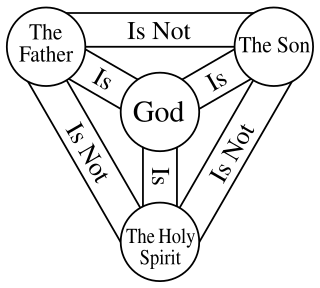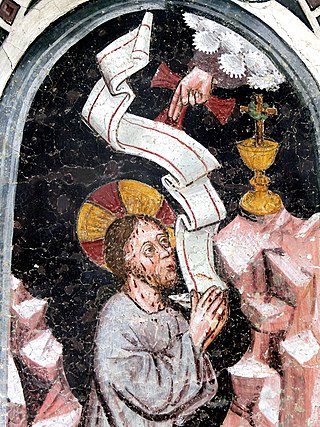
A ghost is the soul or spirit of a dead person or animal that is believed to be able to appear to the living. In ghostlore, descriptions of ghosts vary widely, from an invisible presence to translucent or barely visible wispy shapes to realistic, lifelike forms. The deliberate attempt to contact the spirit of a deceased person is known as necromancy, or in spiritism as a séance. Other terms associated with it are apparition, haunt, phantom, poltergeist, shade, specter, spirit, spook, wraith, demon, and ghoul.

Pentecostalism or classical Pentecostalism is a Protestant Charismatic Christian movement that emphasizes direct personal experience of God through baptism with the Holy Spirit. The term Pentecostal is derived from Pentecost, an event that commemorates the descent of the Holy Spirit upon the Apostles and other followers of Jesus Christ while they were in Jerusalem celebrating the Feast of Weeks, as described in the Acts of the Apostles.

The Christian doctrine of the Trinity is the central doctrine concerning the nature of God in most Christian churches, which defines one God existing in three coequal, coeternal, consubstantial divine persons: God the Father, God the Son and God the Holy Spirit, three distinct persons sharing one homoousion (essence) "each is God, complete and whole." As the Fourth Lateran Council declared, it is the Father who begets, the Son who is begotten, and the Holy Spirit who proceeds. In this context, the three persons define who God is, while the one essence defines what God is. This expresses at once their distinction and their indissoluble unity. Thus, the entire process of creation and grace is viewed as a single shared action of the three divine persons, in which each person manifests the attributes unique to them in the Trinity, thereby proving that everything comes "from the Father," "through the Son," and "in the Holy Spirit."

Spirit possession is an unusual or altered state of consciousness and associated behaviors purportedly caused by the control of a human body by spirits, ghosts, demons, or gods. The concept of spirit possession exists in many cultures and religions, including Buddhism, Christianity, Haitian Vodou, Hinduism, Islam, Wicca, and Southeast Asian, African, and Native American traditions. Depending on the cultural context in which it is found, possession may be considered voluntary or involuntary and may be considered to have beneficial or detrimental effects on the host.

Pentecost is a Christian holiday which takes place on the 50th day after Easter Sunday. It commemorates the descent of the Holy Spirit upon the Apostles and other followers of Jesus Christ while they were in Jerusalem celebrating the Feast of Weeks, as described in the Acts of the Apostles.

A spiritual gift or charism is an extraordinary power given by the Holy Spirit. These are believed by followers to be supernatural graces which individual Christians need to fulfill the mission of the Church. In the narrowest sense, it is a theological term for the extraordinary graces given to individual Christians for the good of others and is distinguished from the graces given for personal sanctification, such as the Seven Gifts of the Holy Spirit and the fruit of the Holy Spirit.

A séance or seance is an attempt to communicate with spirits. The word séance comes from the French word for "session", from the Old French seoir, "to sit". In French, the word's meaning is quite general: one may, for example, speak of "une séance de cinéma". In English, however, the word came to be used specifically for a meeting of people who are gathered to receive messages from ghosts or to listen to a spirit medium discourse with or relay messages from spirits. In modern English usage, participants need not be seated while engaged in a séance.

As a general term in theological use, assurance refers to a believer's confidence in God, God's response to prayer, and the hope of eternal salvation. In Protestant Christian doctrine, the term "assurance", also known as the Witness of the Spirit, affirms that the inner witness of the Holy Spirit allows the Christian disciple to know that he or she is justified. Based on the writings of St. Augustine of Hippo, assurance was historically a very important doctrine in Lutheranism and Calvinism, and remains a distinguishing doctrine of Methodism and Quakerism, although there are differences among these Christian traditions. Hymns that celebrate the witness of the Holy Spirit, such as "Blessed Assurance" are sung in Christian liturgies to celebrate the belief in assurance.
In folk belief, spirit is the vital principle or animating essence within all living things. As recently as 1628 and 1633 respectively, both William Harvey and René Descartes still speculated that somewhere within the body, in a special locality, there was a "vital spirit" or "vital force", which animated the whole bodily frame, just as the engine in a factory moves the machinery in it.

Mediumship is the practice of purportedly mediating communication between familiar spirits or spirits of the dead and living human beings. Practitioners are known as "mediums" or "spirit mediums". There are different types of mediumship or spirit channelling, including séance tables, trance, and ouija.

In Protestant Christianity, the relationship between Law and Gospel—God's Law and the Gospel of Jesus Christ—is a major topic in Lutheran and Reformed theology. In these religious traditions, the distinction between the doctrines of Law, which demands obedience to God's ethical will, and Gospel, which promises the forgiveness of sins in light of the person and work of Jesus Christ, is critical. Ministers use it as a hermeneutical principle of biblical interpretation and as a guiding principle in homiletics and pastoral care. It involves the supersession of the Old Covenant by the New Covenant and Christian theology.
The Tà Ôi is an ethnic group of Vietnam and Laos.

The Ivatan people are an Austronesian ethnolinguistic group native to the Batanes and Babuyan Islands of the northernmost Philippines. They are genetically closely-related to other ethnic groups in Northern Luzon, but also share close linguistic and cultural affinities to the Tao people of Orchid Island in Taiwan.

A spirit tablet, memorial tablet, or ancestral tablet, is a placard used to designate the seat of a deity or past ancestor as well as to enclose it. The name of the deity or past ancestor is usually inscribed onto the tablet. With origins in traditional Chinese culture, the spirit tablet is a common sight in many Sinosphere countries where any form of ancestor veneration is practiced. Spirit tablets are traditional ritual objects commonly seen in temples, shrines, and household altars throughout Mainland China and Taiwan.
The Raven Mocker, or Kâ'lanû Ahkyeli'skï, is an evil spirit and the most feared of Cherokee witches. According to Cherokee mythology it robs the sick and dying of their heart. Normally appearing as old, withered men and women, or turning completely invisible except to certain medicine men, they take to the air in a fiery shape, with the sounds of a raven's cry and a strong wind as they hunt for their next victim. After tormenting and killing their victim by slitting the victim's head they consume his heart, and add a year to their life for every year that the slain would have still lived. The sound of a raven mocker means that someone in the area will soon die.

Two-spirit is a modern, pan-Indian, umbrella term used by some Indigenous North Americans to describe Native people in their communities who fulfill a traditional third-gender ceremonial and social role in their cultures.

Shigandang is an ornamental stone tablet with writing, which is used to exorcise evil spirits in east Asia. 石敢當 are often associated with Mount Tai, and are often placed on street intersections or three-way junctions, especially in the crossing, which is often considered a spiritually dangerous place.
Sureban is a village in Belgaum district of Northern Karnataka, India. Usually the place is referred to as Sureban-Manihal. They are separate villages, but in spirit are the same.

For the majority of Christian denominations, the Holy Spirit, or Holy Ghost, is believed to be the third person of the Trinity, a Triune God manifested as God the Father, God the Son, and God the Holy Spirit, each entity itself being God. Nontrinitarian Christians, who reject the doctrine of the Trinity, differ significantly from mainstream Christianity in their beliefs about the Holy Spirit. In Christian theology, pneumatology is the study of the Holy Spirit. Due to Christianity's historical relationship with Judaism, theologians often identify the Holy Spirit with the concept of the Ruach Hakodesh in Jewish scripture, on the theory that Jesus was expanding upon these Jewish concepts. Similar names, and ideas, include the Ruach Elohim, Ruach YHWH, and the Ruach Hakodesh. In the New Testament it is identified with the Spirit of Christ, the Spirit of Truth, the Paraclete and the Holy Spirit.














